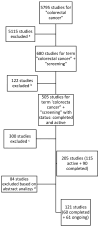Current Progress in Clinical Research in Secondary Prevention and Early Detection of Colorectal Cancer
- PMID: 39941735
- PMCID: PMC11816288
- DOI: 10.3390/cancers17030367
Current Progress in Clinical Research in Secondary Prevention and Early Detection of Colorectal Cancer
Abstract
Colorectal cancer (CRC) is the second leading cause of cancer-related deaths globally. The risk of disease increases with age, as most CRC patients are over 50 years old. Due to the progressive aging of societies in high-income countries, the problem of CRC will increase. This makes the development of new early detection methods and the implementation of effective screening programs crucial. Key areas of focus include raising population awareness about the importance of screening, educating high-risk populations, and improving and developing early diagnostic methods. The primary goal of this review is to provide a concise overview of recent trends and progress in CRC secondary prevention based on available information from clinical trials.
Keywords: CRC; colorectal cancer; screening; secondary prevention.
Conflict of interest statement
The authors declare no conflicts of interest.
Figures

References
-
- WHO Colorectal Cancer. [(accessed on 25 June 2024)]. Available online: https://www.who.int/news-room/fact-sheets/detail/colorectal-cancer.
Publication types
LinkOut - more resources
Full Text Sources

